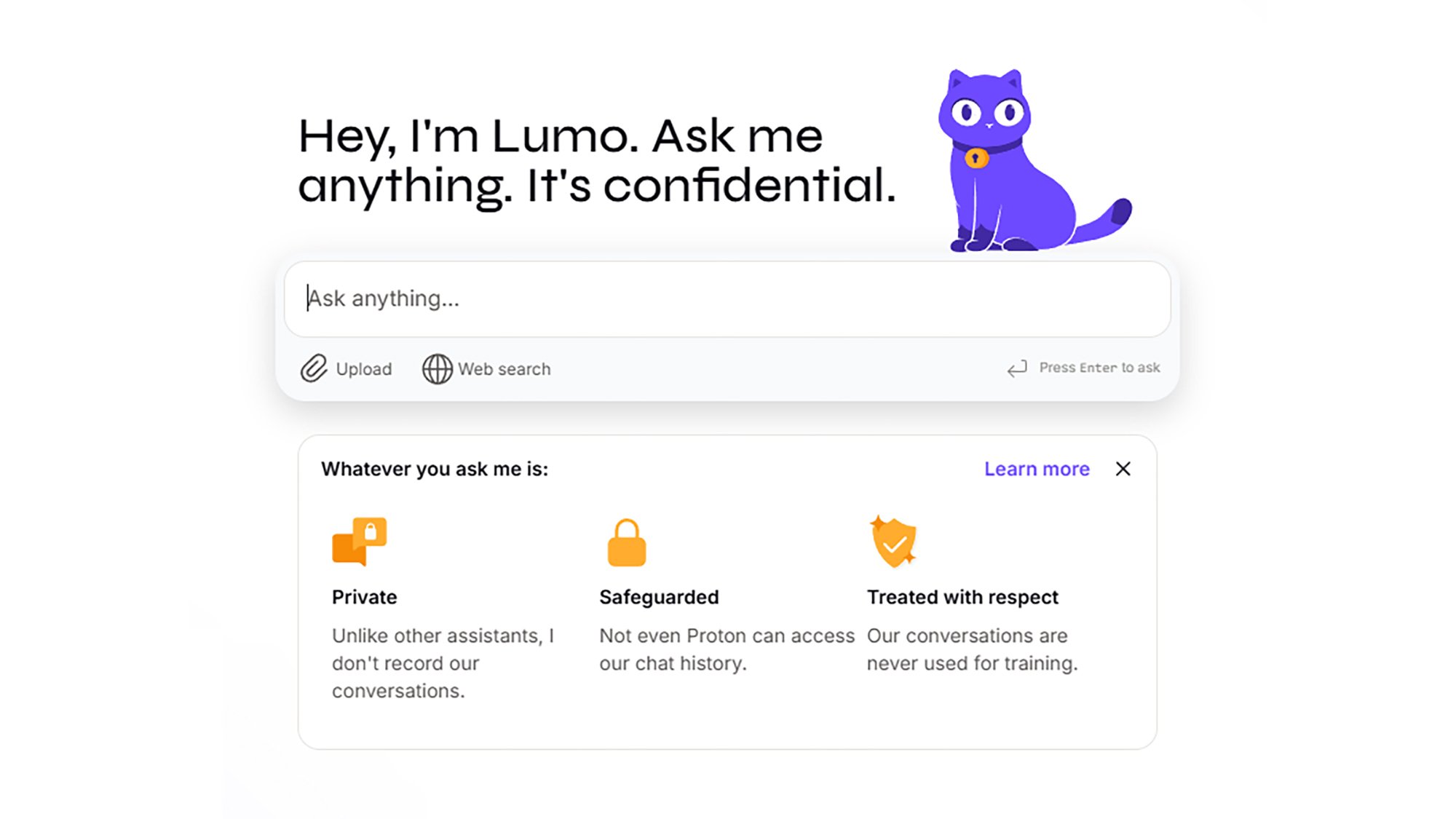For a long time we’ve been covering Proton’s privacy-first offerings, which include cloud storage, a VPN, and a comprehensive email service. The latest string to the Proton bow is an AI chatbot called Lumo, and like everything else Proton makes, it’s built with user privacy as a top priority.
Lumo is available on the web, on Android, and on iOS, and you can get started for free—you don’t even need a Proton account. As you might expect, there’s a $12.99-per-month Pro tier available, which gets you features like a full chat history, more advanced AI models, and higher usage rates in terms of chats and file sizes. Unfortunately, the Pro tier is not included in Proton’s other subscription packages—it’s separate.
On the whole, Proton’s previous apps and services have been impressive. So is Lumo worth a look to avoid the data collection policies of Google, OpenAI, and others? Or are you better off sticking with one of the bigger names in AI?
How Lumo is different
Read the Lumo launch post on Proton’s blog and you’ll see the company is working hard to try and make its AI assistant stand out in terms of how little data it keeps. Of course some data storage is necessary for the bot to actually work, and if you want, you can keep your chats around to refer back to.
First of all, your chats aren’t used to train the AI models Lumo is built on. That’s something you’ll find as an option you can toggle in bots such as ChatGPT and Gemini, while it’s also a selling point for Apple Intelligence. Other AIs are less transparent when it comes to this aspect, so it’s good to see Proton mentioning it up front.
Credit: Lifehacker
There’s also zero-access encryption for your chats, which means no one can take a peek at what you’re reading—not law enforcement, government agencies, or even Proton staff. That’s a clear advantage over other AI platforms, though the likes of Google and OpenAI would argue there are strict legal procedures and strong regulations in place to keep your saved chats private. However, like other AIs using LLMs, Lumo can’t offer full end-to-end encryption, as Proton explains here.
It’s hard to be definitive here in comparing Lumo to other services, because a lot depends on whether you’re saving or erasing chats as you go. To complicate matters further, OpenAI is currently having to hang on to a good chunk of all user chats (even the deleted ones), as part of its ongoing lawsuit with the New York Times. What is clear is that Proton takes the issue more seriously than just about anyone else at the moment.
Credit: Lifehacker
What’s more, Lumo runs on open source AI models, which should mean more transparency. There’s no partnership with any third party in terms of how the service is run, so you can be sure that the policies and protections Proton has implemented aren’t going to be compromised through connections to other companies.
You can read more on Lumo privacy on the Proton website, including information on the large language models (LLMs) used by the chatbot. As ever with Proton, it’s worth remembering that it operates out of Europe—meaning it’s not subject to the same kind of data surveillance and retention policies as somewhere like the U.S.
Lumo vs. ChatGPT
ChatGPT has been around for much longer than Lumo, and had many more billions of dollars invested into it. So clearly, ChatGPT is going to be better than Proton’s new arrival. A more interesting question is whether Lumo gets close enough to ChatGPT to make it appealing, considering its privacy-first approach.
For quick and simple queries, Lumo works perfectly well: I tried sports scores, tech buying advice, document summarization, and movie recommendations, and the chatbot gave back useful and accurate answers most of the time. Its data is occasionally out of date, but that can be fixed by enabling the Web search feature.
Credit: Lifehacker
Lumo can do coding and translation, though I didn’t test these quite as extensively, being neither a linguist nor a coder. The AI is fast, with most prompts answered quickly, and it’s all delivered in a polished, clean user interface. What’s more, I managed to fire off quite a few queries and chats before hitting any kind of usage limits.
Comparing it directly to ChatGPT, it’s not quite there: The Lumo responses are more generic and boilerplate, the structure of the responses aren’t as well done, and you don’t get quite the same nuance in feedback. You can tell it’s built on older AI models, basically, and that matters more as you move to more advanced prompting. Lumo won’t give you advanced features like Deep Research or image generation either.
Credit: Lifehacker
I do like the look and feel of Lumo, and the Proton Drive integration is a nice touch—even if something like Gemini can plug into every Google app there is, that’s not necessarily something you want to happen. There’s always going to be a compromise between how much access you’re willing to give an AI chatbot to your apps and files, and what you want to be able to do with it.
With AI now so prevalent, Proton clearly needs a chatbot on hand for user requests, and its particular focus on privacy and security is to be applauded. It’s definitely an option to go to if you’re an existing Proton user or if you care about data protections first and foremost. For the best AI models and most features, though, you’re going to have to go elsewhere, and put up with a few trade-offs in terms of how your data might be used.
Disclosure: Lifehacker’s parent company, Ziff Davis, filed a lawsuit against OpenAI in April, alleging it infringed Ziff Davis copyrights in training and operating its AI systems.
